The following list of things to know about your new baby are things that I personally experienced and researched to make sure they were normal. They are all things that I really wish I would have known prior to holding my newborn baby in my arms. It sure would have alleviated a lot of stress and confusion!
I hope that you find this list helpful in preparing you for the crazy 6 months of motherhood that awaits you.
I am NOT a doctor. If you have concerns about anything related to your baby or their health you should speak directly to your pediatrician.
24 Important Things to Know About Newborns
1. When your baby is first born, its stomach is the size of a marble
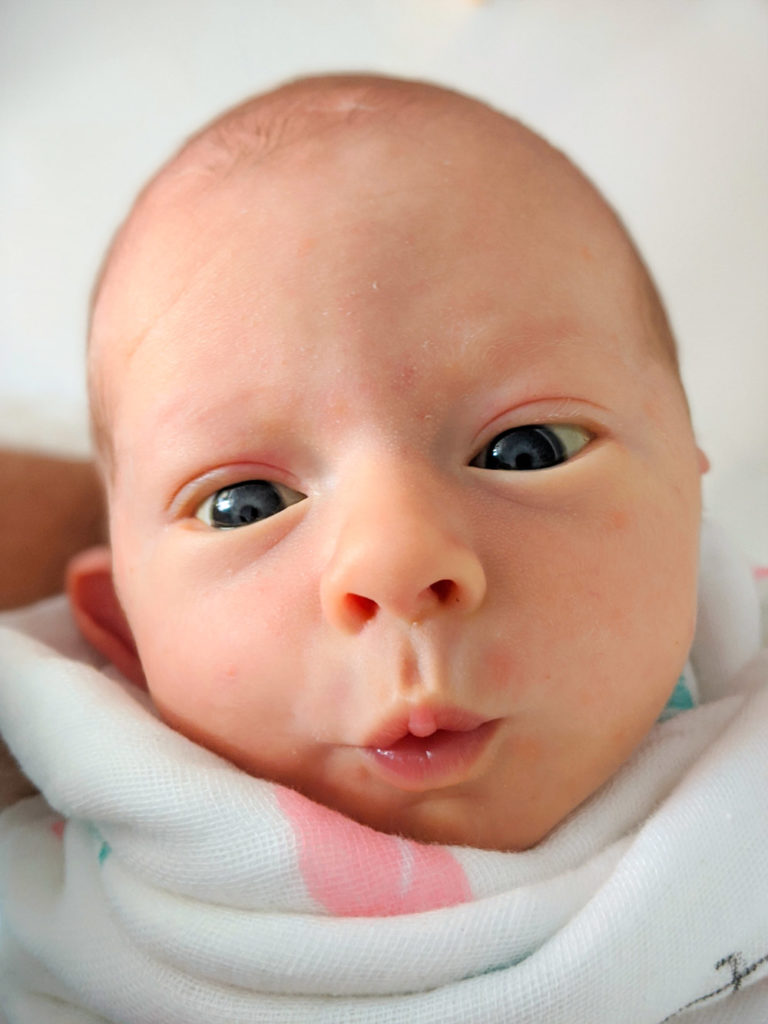
There are few things that are more stressful than trying to breastfeed your newborn baby. Figuring out how to get them to latch is challenging, especially if they are “tonguetied”. And knowing how much they’re actually getting out and whether it’s enough seems impossible.
Before your milk comes in, your breasts produce something called colostrum. It is thick, sticky, and usually yellow in color. And there is very little of it. Every single mother that I’ve talked to has said they were so nervous because the amount of colostrum they were producing was so minimal and definitely wouldn’t be enough to feed a baby.
Relax moms, don’t worry. First of all, your baby can go for days without eating a thing once they’re born. And second, their stomach is the size of a marble. So even that tiny amount of colostrum that you’re producing is enough to fill their belly.
2. If your baby has to go to the NICU, start pumping
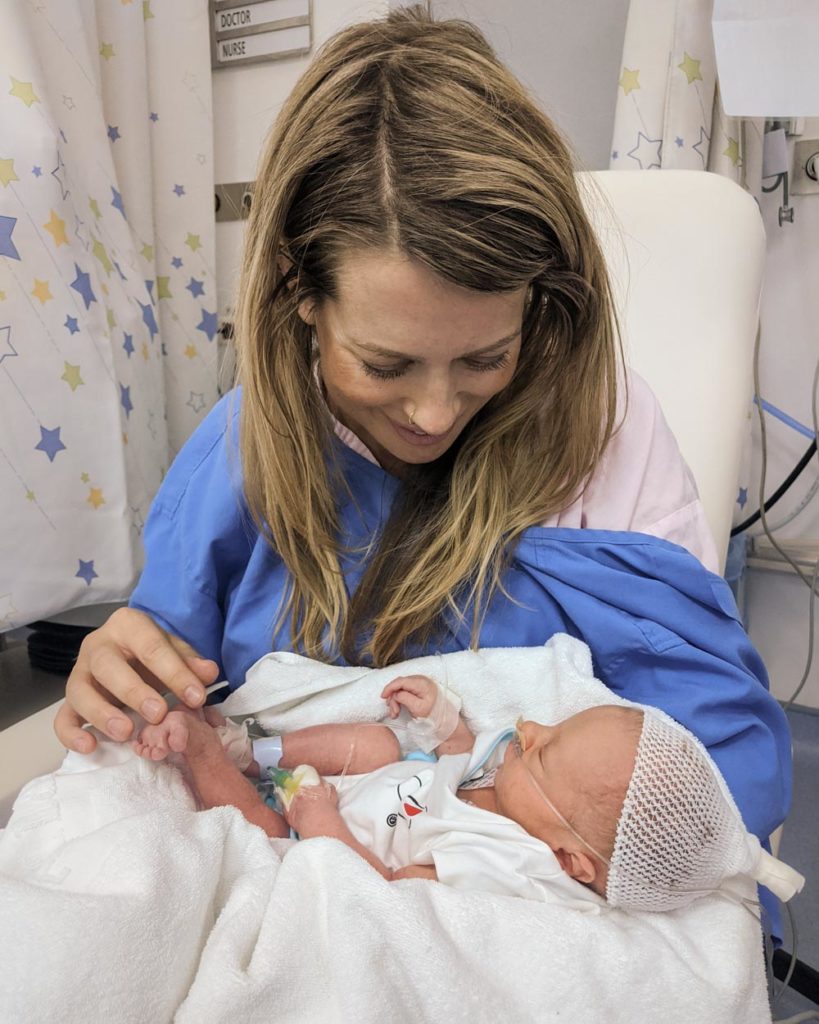
My water broke when I was 35 weeks and 5 days pregnant and because my baby was still breech, I had to have a c-section. Normally when you give birth, the liquid that is in your baby’s lungs is squeezed out during their trip through the birth canal. But with a c-section they don’t have that “luxury”.
Because of the c-section, my baby was born with some excess liquid in his lungs and had to spend 2 nights in the NICU. The best way to initiate milk supply is through skin-to-skin contact and (obviously) attempting to feed your baby so if your little one is in the NICU, you miss out on that important early bonding time.
So while we were waiting for our baby to recover, my husband would play me videos of cute babies while I attempted to express and pump milk (it’s super weird but it actually helps). This got my milk flow initiated so when our baby boy was delivered to our room we were able to get him breastfeeding quickly and without too much trouble.
3. Your newborn will be given an Apgar Score

Newborns babies are assigned what is called an “Apgar Score” which stands for Appearance, Pulse, Grimace, Activity, and Respiration. Each is given a score on a scale of 0 to 2 with 2 being the best score.
Appearance refers to your baby’s skin color, pulse to the heart rate of the baby, grimace is their reflex response, activity is their muscle tone, and respiration is their breathing rate.
Obviously a rating of 10 would be best, but generally anything 7 or over is considered normal. If your baby gets a low rating then they’ll need some additional support and may not be immediately placed on your chest.
4. The first poop is greenish-black
Your baby’s first poop will be a thick, sticky, tar-like substance that is greenish-black in color and has to be literally scrubbed off of their butt. This is called “meconium” and it’s made up of the stuff your baby ingested in-utero including cells, mucus, amniotic fluid, and bile.
The first one is usually the worst but subsequent poops are also black and sticky until it’s all passed through. Some babies have their meconium poo while still in the womb which can clog their airways.
5. They’ll be covered in hair
Many babies are covered with fine hair all over their bodies (and specifically on their backs). This is called “lanugo” and it will go away after a few months. Don’t worry, your baby won’t be furry forever!
6. You’ll need to give them Vitamin D for a year
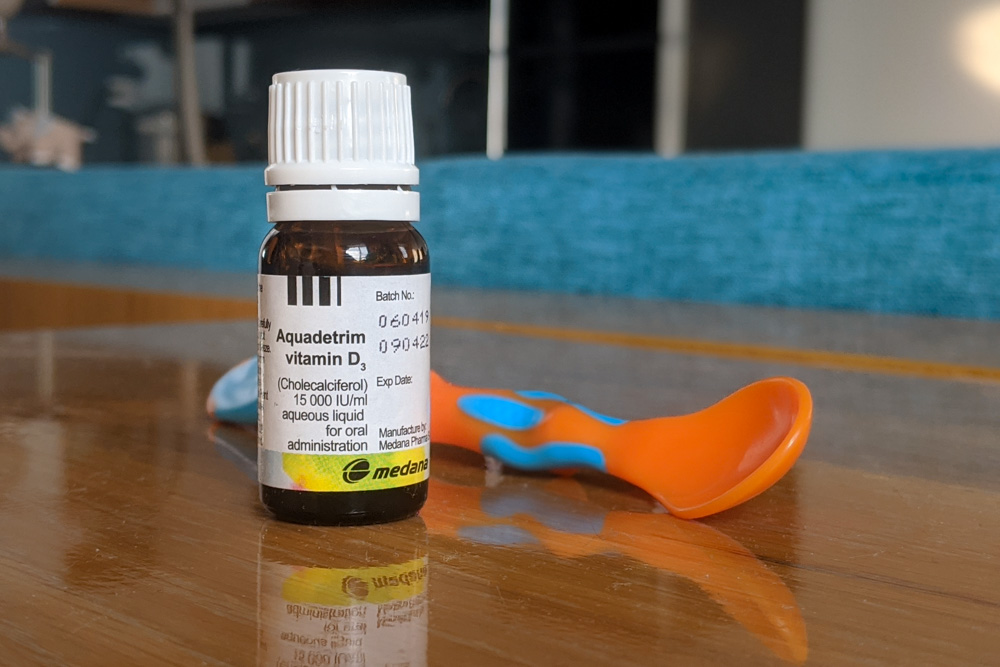
While breastmilk is a great source of nutrients for your baby, it probably won’t provide them with enough vitamin D. And since sun exposure (a great source of vitamin D) isn’t recommended for babies, they are at risk of rickets – a softening/weakening of bones.
You can get vitamin D in a liquid form and just add a drop to their bottle every day. Or if you don’t give bottles, just express some breastmilk into a spoon with a drop of vitamin D and feed it that way. You can put a drop directly into your baby’s mouth but it doesn’t taste very good.
7. They’ll lose weight before they gain
A newborn baby loses 5-8% of their birth weight in their first week of life, but should gain it back shortly thereafter. It can be a bit unnerving to think that you aren’t producing enough milk to help them grow but don’t worry, it’s totally normal.
8. They’ll sleep A LOT

Having a newborn will undoubtedly be one of the most challenging times of your life. But when you’re baby is 6 months old and requires your constant attention and entertainment throughout the day, you’ll look back fondly at those newborn days.
Newborns should get at least 15-17 hours of sleep in a 24-hour period and some sleep up to 20 hours per day! Not that you’ll be able to get much done, you’ll probably be watching your baby like a hawk while they sleep to make sure they’re breathing (if you’re anything like me).
Even now that my baby is 5 months old, he generally only stays awake for an hour and a half at a time.
9. They should nap every 1 – 2 hours

As your baby gets a bit older they’ll begin to develop more of a nap routine. But early on they’ll need to nap frequently throughout the day. My 5-month-old baby still naps every 1.5 – 2 hours throughout the day except right before bedtime when we try to keep him up for 2-3 hours.
And babies don’t just fall asleep when they’re tired. You can look for the signs like glassy eyes, yawning, and rubbing their eyes but they’ll probably still fight the nap no matter how tired they are. We make our apartment very dark, put on white noise, and I usually have to nurse our baby to get him to fall asleep. His naps last anywhere from 20 minutes to an hour and a half.
I use the Huckleberry app to track his naps. It’s my favorite of the baby tracking apps I’ve used because it gives his “sweet spot” naptime estimate which is almost always accurate.
10. It’s hard to keep them awake during feedings
Newborn babies are notorious for falling asleep during feedings when you know they gotta eat! You can try removing their clothing, tickling their feet, or even sprinkling some cold water on their skin to keep them alert.
11. Newborn babies aren’t manipulating you

After you’ve tried, unsuccessfully, to settle your little one back in their crib, you may think that they are being tricky and are using this tactic to be carried around a bit longer. But babies don’t learn to manipulate you until later (and they will). Plus it’s impossible to spoil a new baby – they really do need all of your love and attention.
During the first few months of a baby’s life, you have to work to establish trust. And when they cry, it’s not just for attention, they genuinely need you. So give that new baby all the snuggles and cuddles that they need and don’t worry that you’re setting up bad habits for the future – you’re not!
12. A crying baby = leaky nipples

It’s very creepy/strange/fascinating how reactive your boobs are to your baby. Hearing my baby cry in those first few months made them leak like crazy. And to this day I look at cute photos of my baby while I’m pumping to stimulate more milk flow. Even looking at cute photos of other babies has the same effect.
It’s super creepy but also pretty incredible what our bodies are capable of!
13. You’ll hear fantom crying when you shower
Or is this just me? Every time I shower I am sure I hear the faint sound of my baby crying. So I rush through everything and emerge to find that he is happy as a clam. It’s just a subtle reminder that you’ll never have any relaxing time to yourself ever again.
14. If they have a fever over 100°, take them to the doctor
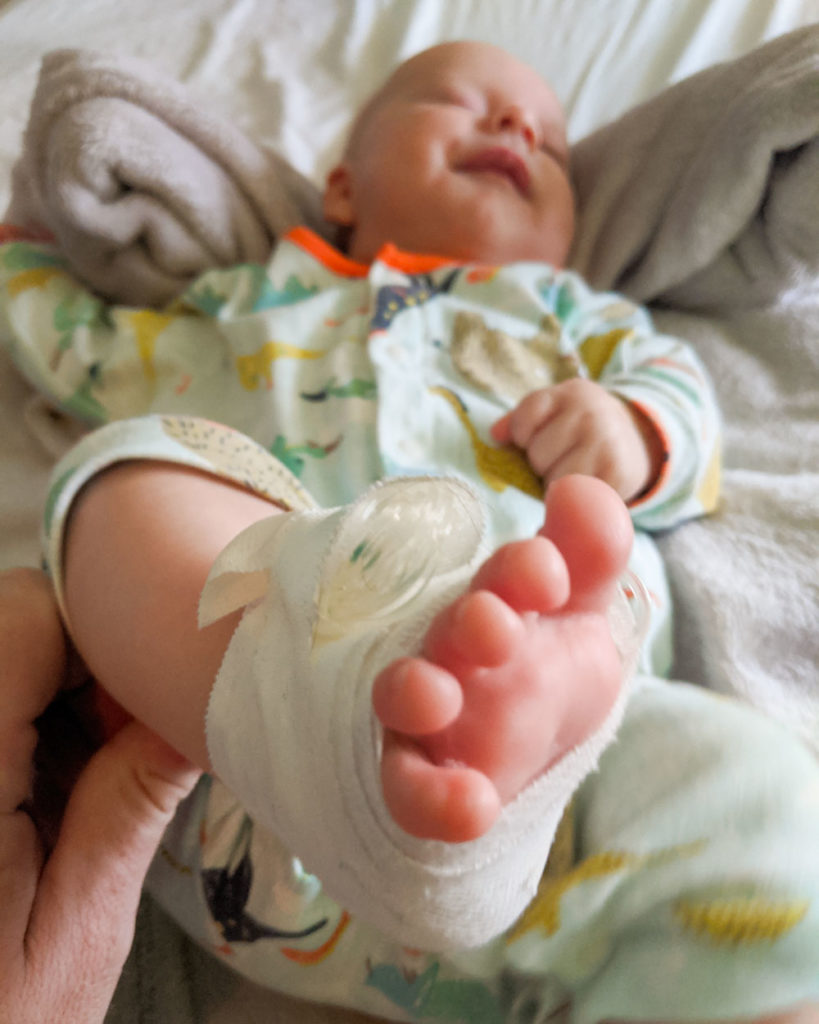
When our baby was about 3 months old he had a particularly fussy day. We couldn’t figure out what was wrong and continually monitored his temperature. Once it reached 100° F, we decided to take him into the clinic.
The doctor immediately knew that it was an infection. So to narrow it down he checked our baby’s lungs, ears, and his fontanelle (soft spot) to rule out a lung infection, ear infection, or blood infection. Really the only thing left to check was his urine to see if it was a UTI (urinary tract infection) and bingo!
We learned a few things from the experience – first of all that anytime your baby has a temperature over 100° and is fussy, it means infection. And second, that babies under 3 months require antibiotics to be administered intravenously (through an IV).
So even though a UTI in an adult can be easily and quickly treated, a small baby requires a 7-10 day stay in the hospital to receive antibiotics while being monitored.
And no, UTIs are not particularly common in babies (especially boys) and no, we still don’t know what caused it.
15. It’s difficult to have a benchmark
The most frustrating thing about taking your baby to the doctor is understanding what is considered “normal”. On our last visit, our doctor asked if our baby was very gassy – well, yes compared to me but no compared to my husband? And how can you know if your baby just spit-up (normal) or vomited (might be something more)? And what consistency is normal for their poop?
We’ve scoured the internet for answers and tried to get specifics from our doctor. I’ve finally taken to just examining my friends’ baby poop to make sure it’s similar.
So here are our personal benchmarks for you. Our baby toots probably 10-20 times each day. He often has just a little poo in his diaper – like a “skidmark”. When he does take a large poop it’s the consistency of a milkshake and a light brown/yellowish color. And he takes 1-2 large poops each day. He’s actually thrown up once and it was massive – like an adult-sized vomit. His spit-ups are generally no more than a tablespoon of liquid.
But since he’s generally happy and gaining weight and growing, we’ve stopped worrying so much about comparing him to other babies.
16. There should be nothing in their crib
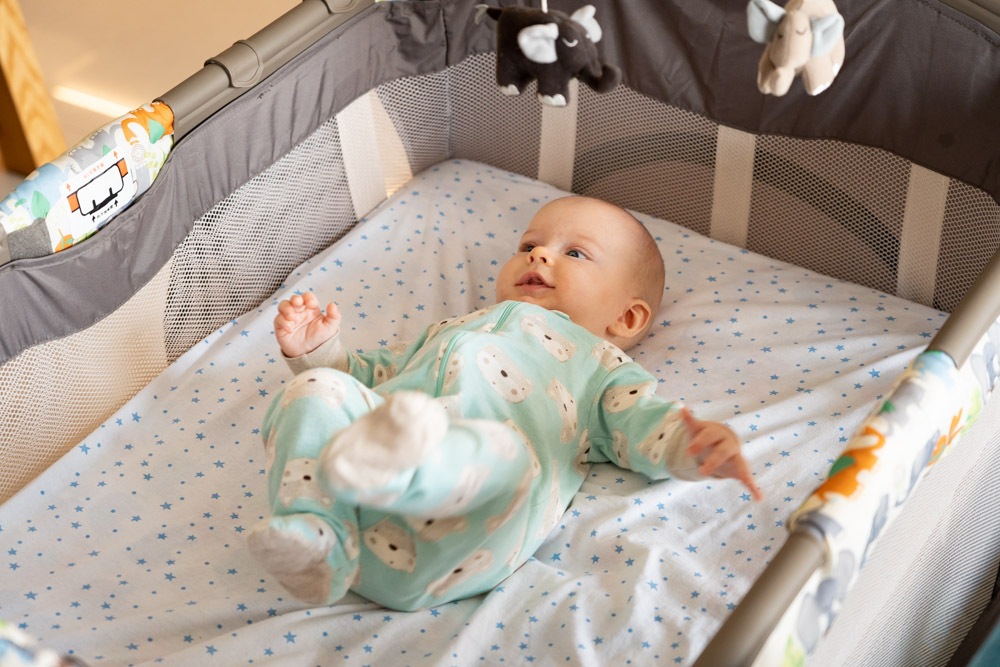
The most horrifying thing about being a new parent is reading about the dangers of SIDS (Sudden Infant Death Syndrome). This is when seemingly healthy babies die an unexplained death, usually during sleep, when they are under 1 year old.
It is believed that SIDS is associated with defects in the portion of an infant’s brain that controls breathing and arousal from sleep. So if an infant suffocates in their crib, a normal, healthy baby will likely awaken and struggle, while a baby with these defects may not wake up at all.
There are so many things you can do to help prevent SIDS including:
- Putting your baby to sleep on their back
- Co-sleeping for one year (having your baby sleep in your room)
- Keeping their crib free of any blankets, pillows, stuffed animals, and crib bumpers
- Keeping any cords or strings away from the crib
- Not let them overheat (if their neck feels sweaty, they are too hot)
- Offering a pacifier
- Not falling asleep while breastfeeding or while your baby is sleeping on you
When we gave birth I had no idea that babies weren’t supposed to have anything at all in their crib. And since he was born premature we didn’t have any clothes that fit him properly. I was so concerned about keeping him warm! Invest in a few sleep sacks and footie onesies in preemie (just in case), newborn, and 0-3 month sizes and keep their crib totally bare.
17. Cold is better than hot

As I mentioned above, one of the risks of SIDS is your baby overheating. The ideal room temperature for babies is between 68° and 72°F for sleeping and they should not wear a hat to bed. You should dress them with just one extra layer than what you are wearing to bed. If their head feels really warm or if there is sweat on the back of their neck, you should probably turn the temperature down or dress them in something cooler.
18. You should co-sleep
Co-sleeping is defined as sleeping in close proximity to your baby – in a cot next to the bed, in a crib in the same room, or in the same bed. And it’s cited as one of the ways to reduce the risk of SIDS.
Keep a cot close to your bed so that you can hear and respond to your baby when they cry in the middle of the night. It’s safer for baby and will bring you more peace of mind. Because if you’re anything like me you’ll wake up throughout the night to stick a finger under their nose to make sure they’re still breathing.
Read all about the risks, benefits, and rewards of bedsharing here!
19. The first poop after trying banana is horrifying
No, your baby does not have worms, don’t worry.
20. You don’t need to give babies water until they are 6 months old
Babies get all the water they need in the first 6 months from breastmilk and/or formula. There’s no need to give them water until they begin eating solid food, which is usually around 6 months. Even then they’ll probably just take a few sips, if any. It’s good to give it at meals anyway to get them used to it.
And it’s best not to start your baby on coconut water or any other sweet beverages. This will just make it harder for them to embrace plain old, boring water.
21. Pooping frequency can vary
Your baby might poop daily or have a massive blowout just once a week. As long as your baby is happy and eating regularly, you shouldn’t be too worried about the frequency of their pooping.
Unless it stretches into well over a week without a poo – then you might want to check in with your doctor in case something else is going on.
22. Your health gets deprioritized
After my baby was born I had only one checkup for myself. The doctor checked out my c-section scar, felt my pelvic area, and told me when I would be able to exercise and have sex again. I haven’t been back since and I have no idea if my body has healed properly.
Of course we’ve taken our baby to the doctor countless times for checkups and vaccines but my doctor has never said anything about a follow-up appointment for me. Moms – don’t neglect your own health!
23. Babies can’t have honey until they are 1 year or older
Babies should not digest honey when they are under the age of one because of the risk of “infant botulism”. Honey can contain spores of a bacteria called clostridium botulinum which their less developed immune systems cannot handle. This serious condition attacks the body’s nerves and can lead to dehydration and even pneumonia.
Best to keep honey completely out of your baby’s diet until they hit that one-year milestone.
24. Trust your mom-instincts
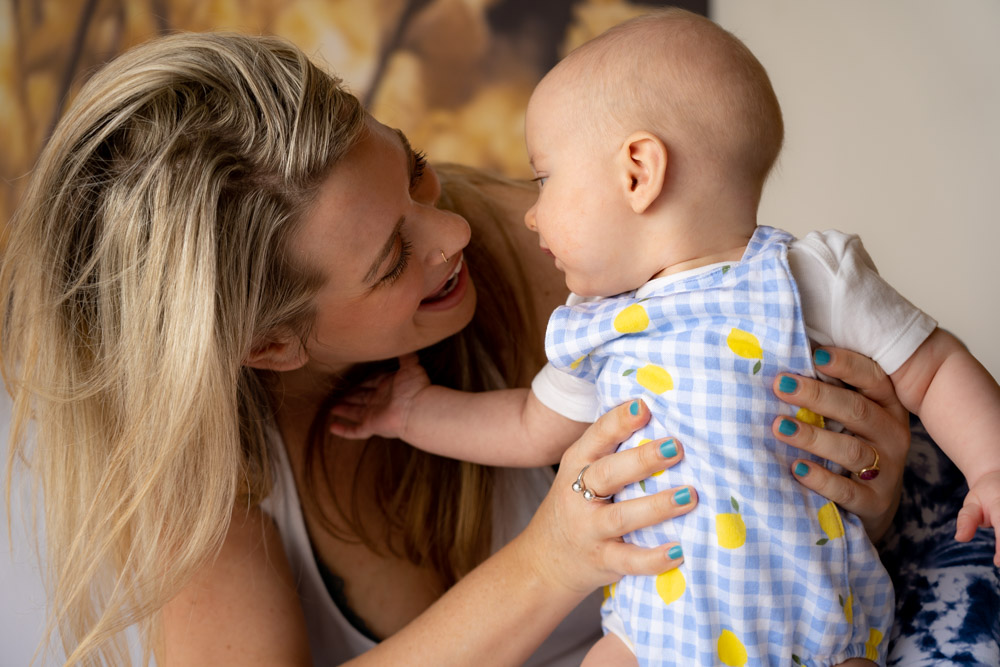
Generally speaking, if your baby is happy and gaining weight, you shouldn’t be concerned. Your baby will differ from other babies in countless ways and you’ll make yourself crazy if you’re always comparing.
Babies can poop as often as several times a day, or as infrequently as once a week. The poop can range in color and consistency (although you should call your doctor if your baby has white or red poop). They may sleep through the night right away or wake up every few hours until they’re 3 years old. All of these are in the range of “normal”.
So mommas, if your baby is happy, gaining weight, and your instincts tell you all is well, don’t fret about the small stuff! You have taken on one of the most difficult jobs in the world and you’re doing an amazing job already!

